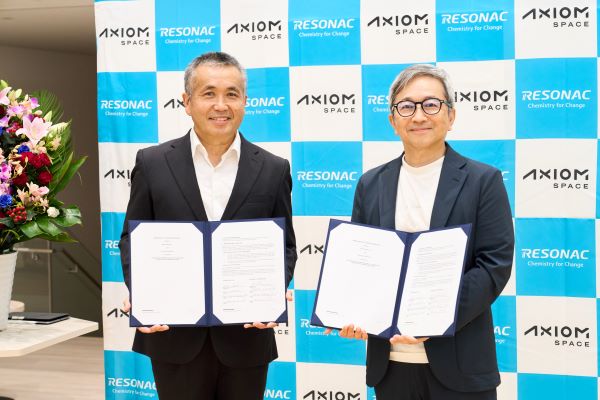The collaboration paves the way toward leveraging microgravity to advance next-generation chip technologies

Koichi Wakata from Axiom Space (left) and Masato Fukushima, CTO of Resonac (right)
Axiom Space, a leader in commercial space infrastructure, and Resonac Corporation, a leading provider of cutting-edge materials solutions in the semiconductor industry, have signed a Memorandum of Understanding (MoU) to collaborate on the research, development and manufacturing of high-performance semiconductor materials in the environment of space.
The collaboration paves the way toward leveraging microgravity to advance next-generation chip technologies and accelerate the in-space manufacturing market.
“The unique environment of space offers immense potential for advancing semiconductor materials, especially in crystal growth,” said Masato Fukushima, Resonac Chief Technology Officer. “Partnering with Axiom Space, we aim to accelerate experiments and drive innovation in materials, fostering industrial growth and societal progress.”
Under the agreement, Axiom Space and Resonac will explore the potential of microgravity and low-Earth orbit (LEO) vacuum conditions to produce next-generation semiconductor materials for critical semiconductor applications and chip packaging.
The absence of convection and sedimentation in the microgravity environment provides the opportunity to grow defect-free semiconductor bulk crystals, resins and 2D materials. The companies plan to leverage the International Space Station, Axiom Space’s orbital platforms, and the future Axiom Station to advance from proof-of-concept to commercially viable scale manufacturing.
Under this MoU, Resonac also plans to extend its current work with Axiom Space where Resonac is developing molding compounds that can reduce soft errors when semiconductor devices are exposed to space radiation. Soft errors are caused when cosmic rays enter a transistor, and electrons are thrown away causing the bits to become inverted. To solve this challenge, Resonac is testing simple devices fabricated with various compositions of molding material in the external and internal environment of the International Space Station.
Subscribe to our newsletter & stay updated.